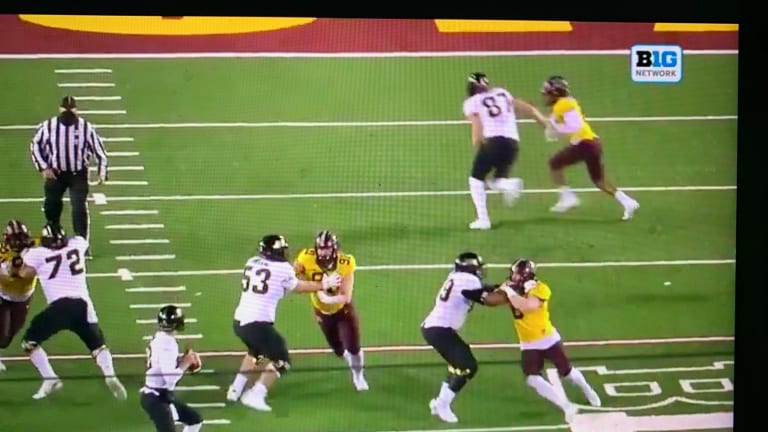
There's a Remedy for Bad Calls Like the One that Robbed Purdue. Use it.

I don’t want to get into whining about bad calls. Because if you watch sports, you know they happen. Frequently.
Purdue has every right to feel robbed. It lost to Minnesota 34-31 on Friday night when a game-winning touchdown with 1:29 left was wiped out by a phantom pass-interference call.
What I do want to say is. . . this type of call needs to be subject to video review in the final minute or two of games. At the very least.
I’m gonna take a guess here: An official saw 6-5, 255-pound Purdue tight end Payne Durham (No. 87, shown above) accelerate past 5-11 195-pound Minnesota DB Phillip Howard—and assumed Durham must have pushed Howard. Yes, Durham had his arm out. But there was little if any contact. And the official wasn’t in the right place to see what happened. But he made a call, anyway. Here's the video.
That’s what coaches refer to as ``anticipating the call.’’
And that is something coaches absolutely hate.
A bad call reflects poorly on the sport. Check out these Tweets of outrage from people like Scott Van Pelt and Gil Brandt.
I understand why judgment calls aren’t considered reviewable. That, in theory, would undermine a very subjective area. And add to the delays of game that no one wants.
But since many plays are dissected with freeze-frames of whether a knee was down, or a foot was inbounds, it makes no sense to force officials to make a game-changing call with the naked eye on a bang-bang play.
I would think officials would welcome this safety net.
If the ref who threw the offensive pass-interference call against Durham doesn’t feel very queasy this morning about his mistake, I would be very surprised.
Refs are good people; they want to get it right.
It’s not an easy job. If anyone thinks it is, I would suggest trying it. I officiated intramural basketball games for a time in college and experienced that firsthand.
The disappointment that Jeff Brohm and his Boilermakers are feeling this morning must be crushing. The difference between 3-1, which Purdue could have been, and 2-2, where Purdue finds itself, is pretty big.
On the other hand, the Boilers had many chances to win and couldn’t get it done. A blocked field goal. A missed field goal. A defense that couldn’t stop Minnesota. Plenty of time to recover and score after the phantom OPI.
The bottom line is, officials need to have a way to correct this kind of mistake. If they can use video to see the exact moment a knee went down on a fumble/no-fumble, they need to be able to reverse a call when there’s an obvious mistake in judgment.
Judgment calls do get changed. We saw it dramatically when Clemson coach Dabo Swinney intimidated a ref into picking up a pass-interference flag in the Notre Dame game.
Unfortunately for Purdue, Jeff Brohm was not in position to work the refs similarly.
We saw the NFL respond when the Rams got past the Saints and into the Super Bowl in 2019. As a result, coaches were allowed to challenge plays called pass interference and not called pass interference. It chickened out in 2020 and peeled back the rule. Bad move. Bogged down in the subjectivity question.
College football needs to show the NFL that it abandoned a good idea. Or at least have a video official letting the on-the-field officials know they need to reverse a call.
The principle of getting it right via video review is well-established. When a controversy like this happens, the people who oversee the game need to close the door on an unacceptable loophole.
Just get the calls right. It's not that hard to do.